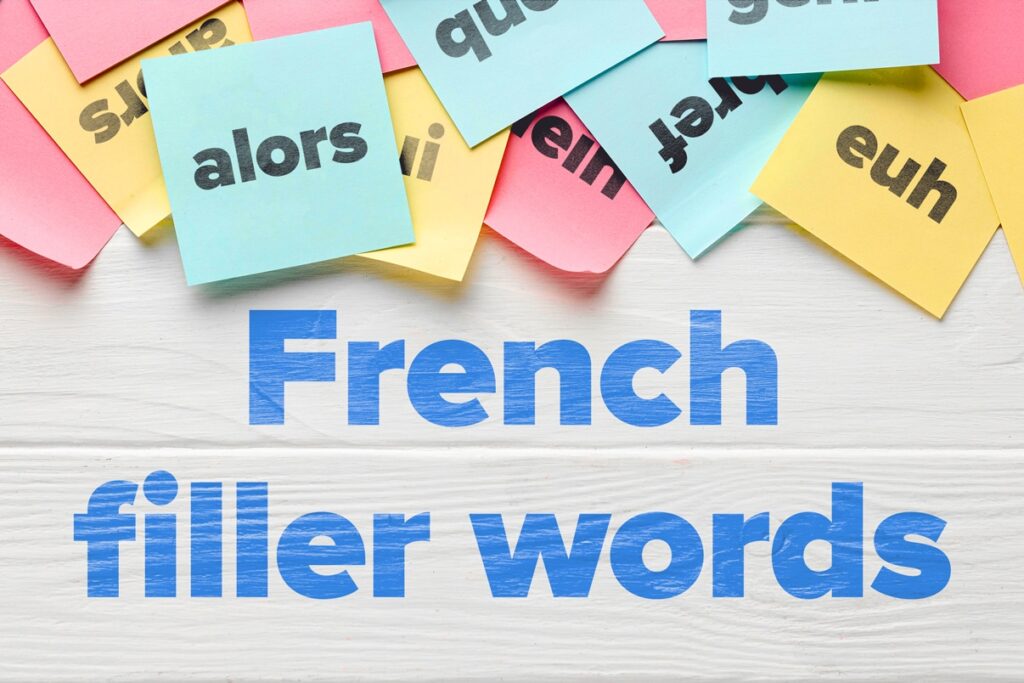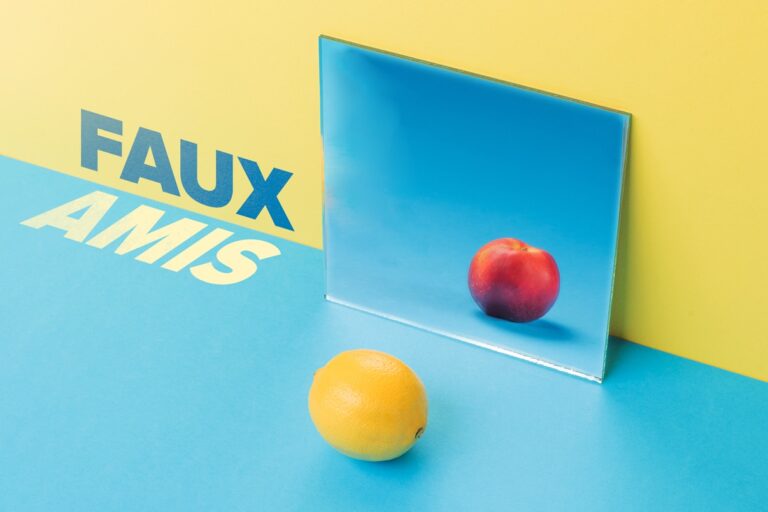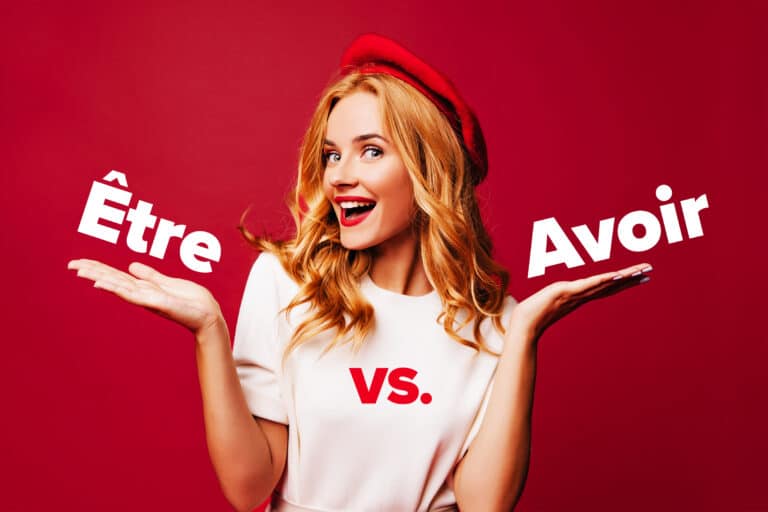Contents
20 French Filler Words to Help You Sound Natural

Filler words are used in every language, such as “um,” “well” or “like” in English. Using the French versions can help you sound more like a native speaker and make your speech flow more naturally.
With these 20 indispensable French filler words, you’ll be able to take pauses while speaking without leaving awkward silences. Some will also help you emphasize what you’re saying, contradict or affirm, summarize your thoughts or transition to another topic.
Download: This blog post is available as a convenient and portable PDF that you can take anywhere. Click here to get a copy. (Download)
Essential French Filler Words
If you enjoy video lessons, check out this FluentU French YouTube video to learn 12 phrases that will help you sound more natural when speaking French:
And here are even more French filler words and phrases that are commonly used by native speakers:
1. Alors
Alors is probably the most common filler word and translates to “so” or “well” in English. It’s often not regarded as an “informal” filler word. This word can be heard in classrooms (by both students and teachers), speeches, business presentations and even in political proceedings. In fact, you can even use it in formal writing!
It’s often used as a transition word at the beginning of a sentence to draw attention to a topic or a change of topic, like in this example:
Alors, comment ça va ? (So, how’s it going?)
Ça va bien, merci. Et toi ? (It’s going well, thanks. And you?)
Alors can also be used in place of the English expression “So what?” In this sense, it asks for clarification of a previous statement, often in a rude or sarcastic way.
J’ai déjà lu ce livre. (I already read that book.)
Et alors ? (So what?)
2. Euh
Euh is another extremely common filler word. It’s the French equivalent of the English word “uh” or “um,” and it’s used pretty much the same way. Like in English, euh is generally used as a pause or a moment to think. Unlike alors, it’s very informal.
Est-ce que je peux avoir, euh… un stylo ? (Can I have, uh… a pen?)
Euh, oui. (Uh, yes.)
3. Quoi
Quoi is perhaps the most confusing filler word for beginner French learners. Technically, it translates to “what” in English, and it’s used to ask questions.
Tu as fait quoi ? (You did what?)
As a filler word, quoi better translates as “you know?” or the British “innit?” It’s used to give weight or highlight what you’re saying.
C’est une belle tour, quoi ? (It’s a beautiful tower, you know?)
4. Hein
Related to quoi, hein is another popular French filler word. Hein translates to the English word “huh,” and it can be used in many ways. Firstly, it can be used to indicate that you don’t understand something that has been said. However, be aware that this isn’t very polite.
Dépêche-toi ! Tu vas rater le train ! (Hurry up! You’re going to miss the train!)
Hein ? (Huh?)
J’ai dit que tu vas rater le train ! (I said that you’re going to miss the train!)
Secondly, you can use hein to mean “right?” or in place of the French n’est-ce pas ? (Isn’t that right?).
C’est un bon livre, hein ? (It’s a good book, right?)
Euh, oui. (Uh, yes.)
5. Bref
Bref translates to “brief” in English, and its function as a filler word is pretty self-explanatory. It’s the English equivalent of “basically” or “long story short,” and it’s generally used to sum up a long explanation and give the “low-down” on a particular topic.
Bref, j’ai raté l’interro de chimie. (Basically, I failed the chemistry test.)
Pronunciation tip: While you might be tempted to not pronounce the “f” at the end of the word bref, it actually is pronounced. In theory, the French word bref should rhyme with the English name “Steph.”
6. Ben oui , ben non
Ben oui and ben non are a bit confusing and there’s some debate as to their exact meaning and function. We know the word oui means “yes,”and non means “no,” but the word ben can be seen as an informal version of the French word bien (well).
Together, these two expressions translate to “well, yes” or “well, no.” Basically, they’re used as an affirmation or negation of a previous statement or question.
Est-ce que tu veux un boisson ? (Do you want a drink?)
Ben, oui. (Well, yes.)
Et un croissant ? (And a croissant?)
Ben, non. (Well, no.)
7. En fait
En fait literally translates to the English “in fact,” but it should only be used to contradict something. If you want to use the French phrase for “in fact” in order to confirm something, then you should say en effect instead.
The use of en fait in different social contexts is quite flexible. It can be used in formal French speech as well as in formal French writing. In the informal way, it means “actually.” It can be used when changing your mind, contradicting something that’s been said or clarifying what you’re trying to say.
J’ai conduit pendant cinq heures. En fait, c’était six ! (I drove for five hours. Actually, it was six!)
Pronunciation tip: Like bref, the “t” at the end of the expression en fait is pronounced to rhyme with the other French word fête (party).
8. Genre
Genre is perhaps the filler word that’s most often confused by beginners. It technically means “type” or “gender,” but in informal French, it translates more to the English filler word “like” and is used in the same way as “uh” or “like.”
Je voudrais, genre, un autre crayon. (I want, like, another pencil.)
You can also see it being used in French media, like in this video below:
Pronunciation tip: Keep in mind that this filler word is often pronounced very quickly in informal situations, so it can sound like jor instead of what we’d expect: jen-ruh.
9. Quand même
The expression quand même has two meanings in French. It has a formal meaning of “even though” or “still,” but as a filler word, it can translate as “Wow!” or “No way!” In this sense, it’s used to show surprise or excitement about a given topic or revelation.
J’ai eu l’examen ! (I passed the exam!)
Quand même ! (Wow!)
10. Voilà
Voilà is used to conclude a statement or to present something. It adds a sense of finality and indicates that the speaker has finished their thought or finished providing the necessary information. It’s similar to saying “That’s it” or “There it is.”
Com’è il tuo nuovo appartamento ? (How’s your new apartment?)
Il est spacieux, lumineux et il a une belle vue sur la ville. Voilà, c’est ça. (It’s spacious, bright and it has a beautiful view of the city. Well, that’s it.)
11. Bon
Bon is an adjective that means “good” or “delicious,” but it’s also used as a versatile filler word similar to “well” or “OK” in English. It can be used to speed up a story, to begin or end a thought or even to express frustration or annoyance.
Bon, je vais y réfléchir. (Well, I’ll think about it).
When used to wrap up a thought or conversation, bon is often used together with ben. For example:
Bon, ben, je vais te laisser travailler alors. (Alright, well, I’ll let you work then.)
12. Enfin
Enfin is used to express relief, satisfaction or the conclusion of a thought or situation. It can also be used to introduce a final point or to transition to a new topic. It adds emphasis and provides a sense of closure.
You can also say enfin bref (“anyway” or “in short”) which is similar to just saying bref and is used to transition to a new topic or summarize a conversation.
J’ai finalement terminé mon travail, enfin ! (I finally finished my work, at last!)
13. Bah
Bah is a versatile filler word commonly used in French conversations. It can convey a range of meanings depending on the context and intonation, but it normally translates to “well” in English.
It can be used to express hesitation, disappointment or indifference. It can also be used as a way to fill a pause in conversation or express doubt or uncertainty. It’s often employed to express a casual or nonchalant attitude.
Bah, je pense que je vais rester à la maison ce soir. (Well, I think I’ll stay home tonight.)
D’accord, bah amuse-toi bien ! (Alright, well, have a good time!)
14. Donc
Donc is used to express a logical consequence or inference. It can be translated as “so,” “therefore” or “thus” in English and similarly adds coherence and clarity to the conversation by linking related thoughts or actions.
J’ai oublié mes clés, donc je ne peux pas entrer. (I forgot my keys, so I can’t get in.)
15. Tu vois
Tu vois translates to “you see” in English. It’s commonly used in conversations to seek confirmation or emphasize a point. It serves as a rhetorical question to engage the listener and ensure their understanding.
J’ai étudié toute la nuit, tu vois ? (I studied all night, you see?)
16. Franchement
Franchement translates to “frankly” or “honestly” in English. It’s used to express sincerity or convey a personal opinion. It adds emphasis and indicates that the speaker is speaking candidly or from their genuine perspective.
Franchement, je pense que c’est une mauvaise idée. (Honestly, I think it’s a bad idea.)
17. Bah oui
The phrase bah oui is an expression of agreement or affirmation. It’s used to confirm or acknowledge something that’s obvious or known. It conveys a sense of certainty and agreement in a casual or colloquial manner.
Tu viens à la fête ce soir ? (Are you coming to the party tonight?)
Bah oui, bien sûr ! (Yes, of course!)
18. Tiens
Tiens is a versatile expression used to express surprise, draw attention or indicate a discovery. It can be translated as “look,” “hey” or “here.” It’s commonly used in situations where something unexpected or interesting is being pointed out or shared. It can add a sense of immediacy and intrigue to the conversation.
Tiens, regarde ce que j’ai trouvé ! (Hey, look what I found!)
19. Eh bien
The phrase eh bien is used to express hesitation or uncertainty, or to gather one’s thoughts before speaking. It can be translated as “well,” “um” or “so.” It’s often used at the beginning of a sentence or as a pause in conversation. It helps to add a reflective or contemplative tone to the speech.
Eh bien, je ne suis pas sûr de ce que je vais faire. (Well, I’m not sure what I’m going to do.)
20. Nan, mais…
Nan, mais… is an informal expression used to convey disagreement or to counter a statement. Nan is a casual form of non meaning “no,” and mais means “but,” so it’s similar to saying “no, but…” in English.
J’ai entendu dire que ce film était génial. (I heard that this movie was amazing.)
Nan, mais… je l’ai trouvé plutôt ennuyeux, en fait. (No, but… I actually found it rather boring.)
Filler words are used by French people every day and they’re a big part of speaking like a native. You can see and hear them used in context by watching authentic videos, like the ones on FluentU.
FluentU takes authentic videos—like music videos, movie trailers, news and inspiring talks—and turns them into personalized language learning lessons.
You can try FluentU for free for 2 weeks. Check out the website or download the iOS app or Android app.
P.S. Click here to take advantage of our current sale! (Expires at the end of this month.)
Why Use French Filler Words?
While the topic of filler words may not seem like a big deal compared to French grammar and other vocabulary, these words play a bigger role than you might imagine. In spoken and even in formal written French, filler words make up a surprising amount of the language in terms of frequency.
Filler words are used by French people every day, so they’re a big part of speaking like a native. For more ways to sound like a native French speaker, watch the video below.
It’s nice to know that you don’t need to speak with perfection, no matter what language you’re using.
Pausing or hesitating is natural when speaking, and now you have some authentic ways to fill the space in your French sentences!
Download: This blog post is available as a convenient and portable PDF that you can take anywhere. Click here to get a copy. (Download)
And One More Thing...
If you like learning French at your own pace and from the comfort of your device, I have to tell you about FluentU.
FluentU makes it easier (and way more fun) to learn French by making real content like movies and series accessible to learners. You can check out FluentU's curated video library, or bring our learning tools directly to Netflix or YouTube with the FluentU Chrome extension.
One of the features I find most helpful is the interactive captions—you can tap on any word to see its meaning, an image, pronunciation, and other examples from different contexts. It’s a great way to pick up French vocab without having to pause and look things up separately.
FluentU also helps reinforce what you’ve learned with personalized quizzes. You can swipe through extra examples and complete engaging exercises that adapt to your progress. You'll get extra practice with the words you find more challenging and even be reminded you when it’s time to review!
You can use FluentU on your computer, tablet, or phone with our app for Apple or Android devices. Click here to take advantage of our current sale! (Expires at the end of this month.)











